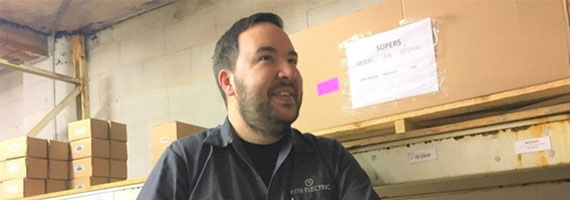
- Entrepreneurship
This Young, Indigenous Entrepreneur Grew a New Business out of COVID-19
Métis young entrepreneur and founder of Edmonton-based Kite Electric Ltd, Jason Courtepatte, has always liked learning what makes things tick. He’s a master electrician and holds special certifications to design and install sustainable energy products like solar panels and car-charging stations for Tesla products. He is even licensed through Transport Canada to operate drones anywhere in Canadian airspace.
Earlier this year, the young entrepreneur’s unending curiosity and his entrepreneurial spirit played major roles in guiding him through an unexpected pivot when the pandemic threatened his small business.
Coping with the COVID-19 threat
Just over a year ago, Courtepatte launched Kite Electric Ltd. because he wanted to provide ethical, sustainable energy options to his community. The company offers design, installation and retrofitting for green energy projects across Alberta, along with other electrical services and drone photo and video imaging.
“Kite Electric is based on integrity and transparency,” he says. “I make it my goal to make sure clients are informed and educated when making decisions about renewable energy and sustainable options. Even if a client doesn’t choose to contract us, at least I know customers are being taken care of by someone who shares my business values.”
In early March, Kite Electric Ltd. was about to mark its first anniversary as a full-time operation. The team, made up of two full-time staff members and six journeymen/apprentices, was gearing up for a busy spring, but then COVID-19 hit and everything threatened to come to a halt.
Like many small business owners across the country, in the early days of the pandemic, Courtepatte had to deal with a lot of uncertainty. “When things closed down there was a lot of fear and concern, and I didn’t want to put my team in harm’s way,” he says.
A new business model born out of COVID-19
The young entrepreneur had spent the past year focusing on growing Kite Electric Ltd. and building his brand and relationships with his customers. When business came to a halt during the pandemic, Courtepatte was left with a serious void to fill and lots of entrepreneurial energy to spare.
He started thinking of other things he could work on besides electrical, and before long, the seed of an idea grew into a new business model. “Kite Ag Systems was born out of the pandemic so I could have something else I could get excited about and learn about,” he explains.
Launching Kite Ag Systems
The new business offering dovetails well with Kite Electric’s existing services and Courtepatte’s personal interest in sustainability and self-sufficient food supply. The concept he’s developing is a turnkey vertical agricultural system that allows growers to produce fresh food year-round and can be operated by just one farmer. Built inside shipping containers, Kite Ag Systems will be able to grow from 100 to 600 pounds of fresh produce weekly, using calibrated growing, fertilization and watering technology.
Courtepatte has been busy during the lockdown seeking as much input as possible so he can grow his new business, and has received positive feedback from politicians and business leaders alike. He argues there’s a very large demand for self-sustainable solutions like those offered by vertical agriculture and sees the possibility for significant business and job growth in the sector. “Once the manufacturing is up and running, we will be able to sustain a large amount of job creation and provide reliable food sustainability throughout Western Canada,” he says.
Government support
While coping with the pandemic has proved stressful, small business relief programs such as the Canada Emergency Business Account (CEBA) have been crucial in helping Courtepatte move forward with his new business offering while keeping his primary company functioning, with no layoffs planned.
To get Kite Ag Systems off the ground, Courtepatte needed to hire an expert who could help him navigate vertical farming technology, which is completely new to him. Through another federal assistance program, the Canada Emergency Wage Subsidy (CEWS), he was also able to hire a new agricultural systems operations manager.
Indigenous community connections
Having grown up in Edmonton, Courtepatte says it was only when he began working with an Indigenous solar installation company in 2017 that he realized he wanted to put more effort into understanding his heritage and connecting more fully with his Métis community. He’s now a member of both the Métis Nation of Alberta (MNA) and the Canadian Council of Aboriginal Business.
He’s also formed a close relationship with the Louis Bull tribe, just South of Edmonton. “I’ve got a very good relationship with them and with their Vice Chief, Desmond Bull, who has spearheaded their clean energy initiatives. They are interested in exploring the Kite Ag System in terms of their Lands for Prosperity Project that they’ve been focusing on recently, so it fits well into that category of self-sustainability and self-food production.”
For Courtepatte, his values and his heritage are intertwined with the work he does. “In terms of me connecting with the Métis community, being urban Indigenous is tough that way,” he says. “But I’m trying to find ways to connect even by doing something like starting this new business model. Renewable energy and self-sustainability are values that I share with my community.”
To learn more about Kite Electric visit their website at: kiteelectric.ca
Or follow them on Instagram





